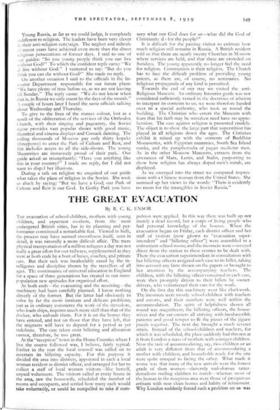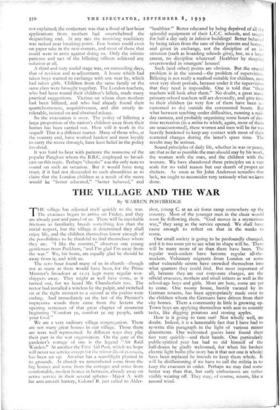THE GREAT EVACUATION
By R. C. K. ENSOR THE evacuation of school-children, mothers with young children, and expectant mothers, from the most endangered British cities, has in its planning and performance constituted a remarkable feat. Viewed in bulk, the process may have seemed smoothness itself; seen in detail, it was naturally a more difficult affair. The mere physical transportation of a million refugees a day was not really a great effort for our railways, supplemented as they were at both ends by a host of buses, coaches, and private cars. But their task was incalculably eased by the intelligence and discipline shown by the travellers of all ages. Thr continuance of universal education in England for a space of three generations has created in our masspDpulation new aptitudes for organised effort.
At both ends—the evacuating and the receiving— the machinery had been carefully planned. I know nothing directly of the former. But the latter had obviously to solve by far the more intricate and delicate problems; just as in ordinary commerce the work of the stevedore, who loads ships, requires much more skill than that of the docker, who unloads them. For it is on the homes they have entered, and not on those that they have left, that the migrants will have to depend for a period as yet indefinite. The care taken over billeting and allocation cannot, therefore, be too great.
At the "reception" town in the Home Counties where I live the course followed was, I believe, fairly typical. Earlier in the year the local council was called on to ascertain its billeting capacity. For this purpose it divided the area into districts, appointed in each a local woman resident as district officer, and arranged for her to collect a staff of local women visitors—like herself, unpaid volunteers. The visitors called at every house in the area, saw the housewife, scheduled the number of rooms and occupants, and settled how many each would take voluntarily, or could be compelled to take if corn_ pulsion were applied. In this way there was built up not merely a dead record, but a corps of living people who had personal knowledge of the houses. When the evacuation began on Friday, each district officer and her staff of visitors (now grown to "evacuation superintendent" and "billeting officer") were assembled in a convenient school-room; and the incomcrs were conveyed direct from the station to these centres to be dealt with. There the evacuation superintendent in consultation with her billeting officers assigned each case to its billet, taking into account any facts shown on the papers or brought to her attention by the accompanying teachers. The children, with the billeting officer concerned in each case, were then promptly driven to their billets by ownerdrivers, who volunteered their cars for the work.
On the first day this machinery went like clockwork. The incomers were mostly school-children with teachers and escorts, and their numbers were well within the accommodation. The spirit of helpfulness shown all round was magnificent; the billeting officers, the housewives and the car-owners all striving with inexhaustible patience and good temper to fit the pieces of the jigsaw puzzle together. The next day brought a much severer strain. Instead of the school-children and teachers, for which it was scheduled, the place suddenly had thrown at it from London a mass of mothers with younger children. Now the task of accommodating, say, two children or an adult is very different from that of accommodating a mother with children; and households ready for the one were quite unequal to facing the other. What made it worse was that many of the new arrivals were the lowest grade of slum women—slatternly malodorous tatterdemalions trailing children to match—whereas most of the houses in the reception area were those of prosperous artisans with neat clean homes and habits of refinement. Why London suddenly forced such a problem on us was not explained; the conjecture was that a flood of last-hour applications from mothers had overwhelmed the despatching end. At any rate the receiving machinery was tasked near breaking-point. Few homes could even on paper take in the new-comers, and most of those that could were in arms against doing so. Only the infinite patience and tact of the billeting officers achieved any solution at all.
A third and very useful stage was, on succeeding days, that of revision and re-adjustment. A house which had taken boys wanted to exchange with one near by, which had taken girls. Children from the same family or the same class were brought together. The London teachers, who had been round their children's billets, made many practical suggestions. Victims on whom slum mothers had been billeted, and who had already found their quarrelsomeness, acquisitiveness, and dirt utterly intolerable, insisted on and obtained release.
So the evacuation is over. The policy of billeting a large proportion of the nation's children away from their homes has been carried out. How will it work in the sequel? That is a different matter. Many of those who, at the country end, have worked hardest and most loyally to carry the move through, have least belief in the policy involved.
It was hard to hear with patience the nonsense of the popular Pangloss whom the B.B.C. employed to broadcast on this topic. Perhaps "cheerio" was the only note to sound on such an occasion. But it would have rung truer, if it had not descended to such absurdities as to claim that the London children as a result of the move would be "better educated," "better behaved," and "healthier." Better educated by being deprived of all the splendid equipment of their L.C.C. schools, and taught for half a day only in inferior buildings! Better behaved by being taken from the care of their parents and homes, and given in exchange, not the discipline of an institution (such as boarding schools give), but, to a large extent, no discipline whatever! Healthier by sleeping overcrowded in strangers' houses!
Such (and other) points are obvious. But the crucial problem is in the second—the problem of supervision. Billeting is not really a method suitable for children, save over very short periods, because under it the supervision that they need is impossible. One is told that "their teachers will look after them." No doubt, a great many primary-school teachers will act devotedly, and give time to their children (as very few of them have been accustomed to do) outside the covenanted hours. But what between teaching under difficulties, running a midday canteen, and probably organising some hours of daytime recreation (in a milieu to which, again, most of them are unaccustomed), these women and men will be far too heavily burdened to keep any contact with most of their scattered charges during the latter's spare time. The results may be serious.
Sound principles of daily life, whether in war or peace, are that as far as possible the man should stay by his work, the woman with the man, and the children with the woman. We have abandoned these principles on a vast scale for no valid reason but our dearth of proper air shelters. As soon as Sir John Anderson remedies that lack, we ought to reconsider very seriously what we have done.























 Previous page
Previous page